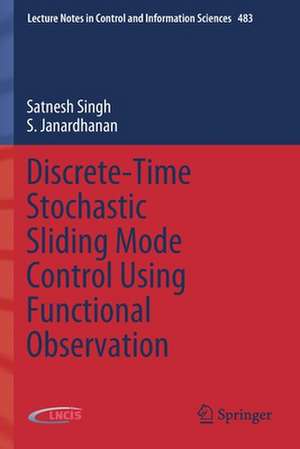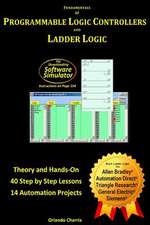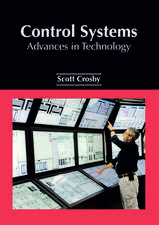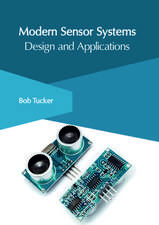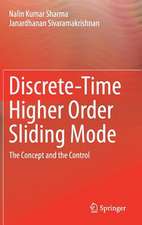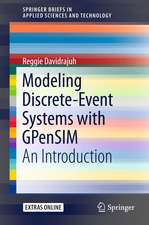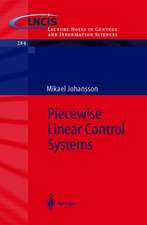Discrete-Time Stochastic Sliding Mode Control Using Functional Observation: Lecture Notes in Control and Information Sciences, cartea 483
Autor Satnesh Singh, S. Janardhananen Limba Engleză Paperback – 26 noi 2020
Discrete-Time Stochastic Sliding-Mode Control Using Functional Observation will interest all researchers working in sliding-mode control and will be of particular assistance to graduate students in understanding the changes in design philosophy that arise when changing from continuous- to discrete-time systems. It helps to pave the way for further progress in applications of discrete-time SMC.
| Toate formatele și edițiile | Preț | Express |
|---|---|---|
| Paperback (1) | 576.09 lei 6-8 săpt. | |
| Springer International Publishing – 26 noi 2020 | 576.09 lei 6-8 săpt. | |
| Hardback (1) | 724.94 lei 6-8 săpt. | |
| Springer International Publishing – 26 noi 2019 | 724.94 lei 6-8 săpt. |
Din seria Lecture Notes in Control and Information Sciences
- 20%
 Preț: 318.81 lei
Preț: 318.81 lei - 15%
 Preț: 633.53 lei
Preț: 633.53 lei - 20%
 Preț: 555.04 lei
Preț: 555.04 lei - 18%
 Preț: 959.98 lei
Preț: 959.98 lei - 15%
 Preț: 696.02 lei
Preț: 696.02 lei - 18%
 Preț: 957.75 lei
Preț: 957.75 lei - 18%
 Preț: 782.42 lei
Preț: 782.42 lei - 18%
 Preț: 894.46 lei
Preț: 894.46 lei - 18%
 Preț: 1111.34 lei
Preț: 1111.34 lei - 20%
 Preț: 347.08 lei
Preț: 347.08 lei - 11%
 Preț: 468.56 lei
Preț: 468.56 lei - 20%
 Preț: 657.16 lei
Preț: 657.16 lei -
 Preț: 387.75 lei
Preț: 387.75 lei -
 Preț: 397.97 lei
Preț: 397.97 lei -
 Preț: 379.86 lei
Preț: 379.86 lei -
 Preț: 394.71 lei
Preț: 394.71 lei -
 Preț: 390.84 lei
Preț: 390.84 lei - 15%
 Preț: 642.51 lei
Preț: 642.51 lei - 15%
 Preț: 648.24 lei
Preț: 648.24 lei -
 Preț: 381.59 lei
Preț: 381.59 lei -
 Preț: 385.62 lei
Preț: 385.62 lei - 15%
 Preț: 641.53 lei
Preț: 641.53 lei - 15%
 Preț: 699.28 lei
Preț: 699.28 lei - 20%
 Preț: 333.72 lei
Preț: 333.72 lei -
 Preț: 379.68 lei
Preț: 379.68 lei -
 Preț: 484.98 lei
Preț: 484.98 lei -
 Preț: 390.63 lei
Preț: 390.63 lei -
 Preț: 423.73 lei
Preț: 423.73 lei -
 Preț: 393.13 lei
Preț: 393.13 lei -
 Preț: 382.36 lei
Preț: 382.36 lei - 18%
 Preț: 737.26 lei
Preț: 737.26 lei -
 Preț: 392.37 lei
Preț: 392.37 lei - 15%
 Preț: 645.28 lei
Preț: 645.28 lei - 15%
 Preț: 637.93 lei
Preț: 637.93 lei -
 Preț: 383.50 lei
Preț: 383.50 lei -
 Preț: 397.59 lei
Preț: 397.59 lei -
 Preț: 407.19 lei
Preț: 407.19 lei -
 Preț: 406.80 lei
Preț: 406.80 lei -
 Preț: 385.08 lei
Preț: 385.08 lei -
 Preț: 387.38 lei
Preț: 387.38 lei -
 Preț: 387.38 lei
Preț: 387.38 lei -
 Preț: 394.71 lei
Preț: 394.71 lei -
 Preț: 391.02 lei
Preț: 391.02 lei -
 Preț: 383.71 lei
Preț: 383.71 lei -
 Preț: 396.62 lei
Preț: 396.62 lei -
 Preț: 382.95 lei
Preț: 382.95 lei -
 Preț: 396.02 lei
Preț: 396.02 lei -
 Preț: 385.08 lei
Preț: 385.08 lei -
 Preț: 384.48 lei
Preț: 384.48 lei -
 Preț: 381.59 lei
Preț: 381.59 lei
Preț: 576.09 lei
Preț vechi: 677.75 lei
-15% Nou
Puncte Express: 864
Preț estimativ în valută:
110.24€ • 115.92$ • 91.09£
110.24€ • 115.92$ • 91.09£
Carte tipărită la comandă
Livrare economică 17 aprilie-01 mai
Preluare comenzi: 021 569.72.76
Specificații
ISBN-13: 9783030328023
ISBN-10: 3030328023
Pagini: 114
Ilustrații: XVII, 114 p. 36 illus., 34 illus. in color.
Dimensiuni: 155 x 235 mm
Greutate: 0.2 kg
Ediția:1st ed. 2020
Editura: Springer International Publishing
Colecția Springer
Seria Lecture Notes in Control and Information Sciences
Locul publicării:Cham, Switzerland
ISBN-10: 3030328023
Pagini: 114
Ilustrații: XVII, 114 p. 36 illus., 34 illus. in color.
Dimensiuni: 155 x 235 mm
Greutate: 0.2 kg
Ediția:1st ed. 2020
Editura: Springer International Publishing
Colecția Springer
Seria Lecture Notes in Control and Information Sciences
Locul publicării:Cham, Switzerland
Cuprins
Preliminary Concepts.- Design of Sliding-Mode Control for Discrete-TIme Stochastic Systems with Bounded Disturbances.- Functional Observer-Based Sliding-Mode Control for Discrete-Time Stochastic Systems.- Functional Observer-Based SMC for Discrete-Time Stochastic Systems with Unmatched Uncertainty.
Textul de pe ultima copertă
This book extrapolates many of the concepts that are well defined for discrete-time deterministic sliding-mode control for use with discrete-time stochastic systems. It details sliding-function designs for various categories of linear time-invariant systems and its application for control. The resulting sliding-mode control addresses robustness issues and the functional-observer approach reduces the observer order substantially.
Sliding-mode control (SMC) is designed for discrete-time stochastic systems, extended so that states lie within a specified band, and able to deal with incomplete information. Functional-observer-based SMC is designed for various clauses of stochastic systems: discrete-time; discrete-time with delay; state time-delayed; and those with parametric uncertainty. Stability considerations arising because of parametric uncertainty are taken into account and, where necessary, the effects of unmatched uncertainties mitigated. A simulation example is usedto explain the use of the functional-observer approach to SMC design.
Discrete-Time Stochastic Sliding-Mode Control Using Functional Observation will interest all researchers working in sliding-mode control and will be of particular assistance to graduate students in understanding the changes in design philosophy that arise when changing from continuous- to discrete-time systems. It helps to pave the way for further progress in applications of discrete-time SMC.
Sliding-mode control (SMC) is designed for discrete-time stochastic systems, extended so that states lie within a specified band, and able to deal with incomplete information. Functional-observer-based SMC is designed for various clauses of stochastic systems: discrete-time; discrete-time with delay; state time-delayed; and those with parametric uncertainty. Stability considerations arising because of parametric uncertainty are taken into account and, where necessary, the effects of unmatched uncertainties mitigated. A simulation example is usedto explain the use of the functional-observer approach to SMC design.
Discrete-Time Stochastic Sliding-Mode Control Using Functional Observation will interest all researchers working in sliding-mode control and will be of particular assistance to graduate students in understanding the changes in design philosophy that arise when changing from continuous- to discrete-time systems. It helps to pave the way for further progress in applications of discrete-time SMC.
Caracteristici
Broadens understanding of sliding-mode control of stochastic discrete-time systems Provides theoretical groundwork for more diverse applications of sliding-mode control Helps readers to cope with various sources of process and measurement noise in their control designs
